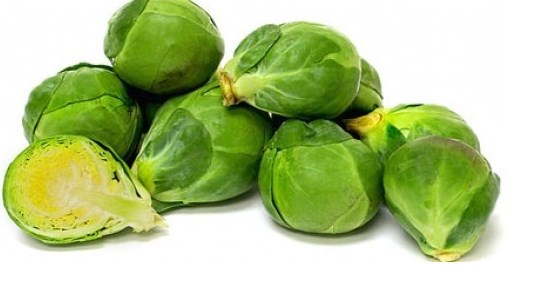https://cdn.steemitimages.com/DQmZDvtEqbC4aapvy1VQkjVCSdvhme4dYA7t6r8iPPj7mNA/coles-de-bruselas-1.jpg
[source](https://okdiario.com/img/recetas/2016/10/08/coles-de-bruselas-1.jpg)

Brussels sprouts contain calories, carbohydrates, fiber, protein, Vitamin A, Vitamin C, Vitamin E, Vitamin K, thiamine, riboflavin, niacin, Vitamin B6, folate, pantothenic acid, calcium, iron, magnesium, potassium, zinc, copper , manganese and selenium. Brussels sprouts contain an important fiber known as prebiotic food, which ensures that these good bacteria are well nourished and help the body prevent infections and reduce stress. Brussels sprouts are an excellent source of vitamin K, with only half a cup, you get 100% of your daily needs. Vitamin K is particularly important for the regulation of bone health and normal bone synthesis, which is particularly deficient in osteoporotic patients. High in calcium and magnesium that helps ensure adequate bone mineralization and reduce the likelihood of mineral leaching. In addition, Brussels sprouts are particularly beneficial in postmenopausal women. The presence of vitamin K in Brussels sprouts, which improves blood circulation, minimizes the risk of strokes, blood clots and even heart attacks. Although this action can be considered unpredictable, you should carefully control the bleeding patterns when combined with known anticoagulant medications. Brussels sprouts and their family of related cruciferous vegetables inhibit the conversion of the male hormone testosterone into the female hormone estrogen, which is undesirable for men who want to achieve a thinner body or improve sexual function. Brussels sprouts can help a lot because it does not completely suppress the production of this hormone, but only enough to prevent it from being overwhelming. The fiber that Brussels sprouts has helps ensure that waste material travels quickly through the digestive tract and minimizes the risk of constipation. Part of the reason, Brussels sprouts are associated with a lower risk of colon cancer is the rapid depletion of waste materials, which reduces the time that healthy cells spend. Thanks to high levels of antioxidants, including vitamin C, regular consumption of Brussels sprouts is associated with a better overall skin condition and slower aging. Brussels sprouts help reduce the effects that these UV rays can have on cells, and together with vitamin C it helps maintain collagen synthesis. Collagen is a structural protein that gives the skin youth strength and elasticity and naturally decreases with age. Brussels sprouts contain numerous useful antioxidants and other phyto compounds that can help reduce the amount of inflammatory markers in the blood and protect it from the consequences of these chronic diseases. Brussels sprouts, which are not well known for their iron content, contain adequate amounts of vitamin C and the trace element of copper, which are important for proper absorption of iron in the blood, where it can be synthesized in red blood cells. Many people with anemia can improve their symptoms by eating foods high in iron and ensuring that the needs of vitamin C and copper are also met.

Originally posted here: https://steemit.com/farms/@luisalberto71/brussels-sprouts-and-their-benefits


No comments:
Post a Comment